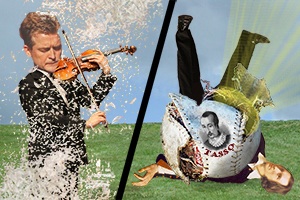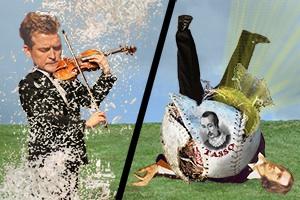
of Tchaikovsky, while Liszt’s negative example
comes apart at the seams
Illustration by Jeff Dunn
The second half was another matter. Listener unenthusiasm was so prevalent, despite especially fine performances, that you could only blame three people for what was pretty close to an postintermission flop: the composers (Maurice Ravel and Franz Liszt, writing on off-days, compared to their best music), and Music Director Michael Tilson Thomas, who inexplicably thawed out these luminaries’ weaker works from cold storage after resting them barely a year.
Kissine is a Russian expatriate living in Belgium, a rather mild-mannered, exquisite orchestrator who deserves far greater recognition. The 17-minute work commissioned by the Symphony, titled Post-scriptum, is structurally a variation on Charles Ives’ famous piece The Unanswered Question, which Kissine discovered as a revelation while a student at the Leningrad Conservatory in the 1970s. Although the music sounds completely different (the five notes of Ives’ theme, though quoted, are not readily discernable since they’re sounded as a single chord), it retains Ives’ transcendental aspirations. Like today’s far richer understanding of the universe compared to that of Ives’ day, Kissine’s piece is a kaleidoscope of sounds and moods kept in check by structural devices of timbral repetition and semicolons of near-silence. At times there are wavelike assaults on the senses, but a gorgeous triadic central section, mysterious and chorale-like, shows that something more than mayhem also rules the roost.
Expectancy Generator
Response to Kissine’s music was positive, with a few cheers and some people standing to applaud. None of the many I spoke to during intermission disliked the piece, even those professing distaste for new music in general. Many were surprised how the piece kept them alert with a sense of expectation, and were anxious to hear it again. What better compliment to receive from an audience?Although violinist Tetzlaff’s fare was completely familiar compared to Kissine’s, his Tchaikovsky was a further thrill to behold. His technique and intonation were infallible, his interpretation idiomatic, his dynamic range impressive. His body language spoke as much as did his strings and bow, and was thus mesmerizing — you don’t want to close your eyes on this artist. Still, while I feel it’s a crime to mention it (considering the overwhelming excellence of all the other attributes of superb virtuosity he possesses), I found his tone ever so slightly on the scrapey side. Perhaps I’ve been spoiled by Hilary Hahn, who’s incomparable in this area. In any case, the prolonged plaudits his performance elicited were thoroughly deserved.
After intermission came Ravel’s Valses nobles et sentimentales. Even great composers write lesser works, and these still may be far better than any that the best submediocre composers can muster. Nevertheless, there are hundreds and hundreds of fine composers out there whose best works are comparable or even superior to this bon-bon of Ravel’s. Why play it again after only a year and leave so many works of quality on the shelf gathering dust? These Valses are among the least played of Ravel’s pieces nationally — and for good reason: They’re assuredly pleasant, but nothing to write home about, especially after anyone so inclined would have already written home about them already a year ago.
Tasso’s Lesson
And then came Liszt’s Tasso: Lamento e Trionfo. This piece is far worse in craft than the Ravel, though it has more compelling themes and it’s of greater historical interest. In a way it’s like watching vintage films on the development of flying machines, where those hopeful inventors jump off buildings intertwined in peculiar devices, and come crashing to the earth.In the early 1850s, Liszt was inventing the symphonic poem. He wrote 13 of them, but only one, Les Préludes, has found any success in the repertory. The reasons can be gleaned in Tasso: too much material, not sufficiently aurally interrelated, broken up by signally awkward transitions. The piece basically comes apart at the seams. Furthermore, it ends abruptly with a weakly prepared trionfo (triumph) that comes across as insincere bombast. The little pleasure I got from listening to it was from realizing how its negative example may have inspired Saint-Saëns and Tchaikovsky to improve their symphonic-poem transitions. That so many later composers could fly is due to the learning from failures like Tasso.
I myself certainly would have been flying if Post-scriptum had been played one more time Saturday night instead of the negligible Ravel or the flawed Liszt. Can it be scheduled for the 2011-2012 season, please?

